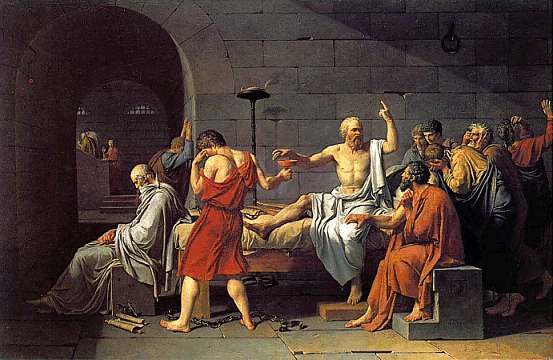|
|
Sokrates
Christ was not simply a wise man as was Socrates, whose free acceptance of death in the name of truth nevertheless has a similarity with the sacrifice of the Cross.
A relief of Sweden's artist Bror Hjorth, showing Walt Whitman, Jesus Christ and Socrates.
Jacques-Louis David, "Death of Socrates" (1787) Socrates in mainly interested in the question of “how should one live?”. If you know what a virtue is then you automatically know how to act in each situation. Socrates believes that nobody does wrong willingly but only due to ignorance and therefore the whole virtue is knowledge because it is impossible to have only a single virtue without having all of them. Knowledge of a virtue automatically leads acting in accordance with it because there is no reason why one should choose a worse option if a better is known. Socrates from THEOSOPHY, Vol. 27, No. 9, July, 1939 Pages 387-394 In 469 BC Phaenarete, the wife of an Athenian sculptor, gave birth to her son Socrates whose fame was immortalized by his pupils, Xenophon and Plato. Despite his poverty, Socrates participated freely in all the cultural advantages of the city, from which not even the humblest citizen was debarred. After spending several years in his father's workshop, he decided that his mission in life was not to be a sculptor of figures, but a moulder of souls. This conviction came to him after hearing that the Delphic Oracle had described him as the wisest man in Greece. Failing to understand the Oracle's statement, yet not daring to contradict it, Socrates went among his learned friends, contrasting their knowledge with his own. He soon realized that they were all as ignorant as he, the only difference being that they were unaware of their ignorance, while he, at least, knew that he knew nothing. He therefore concluded that the Oracle had chosen him as an instrument to prick the bubble of self-deception and conceit which permitted ignorance to parade itself in the borrowed garments of wisdom.
|

